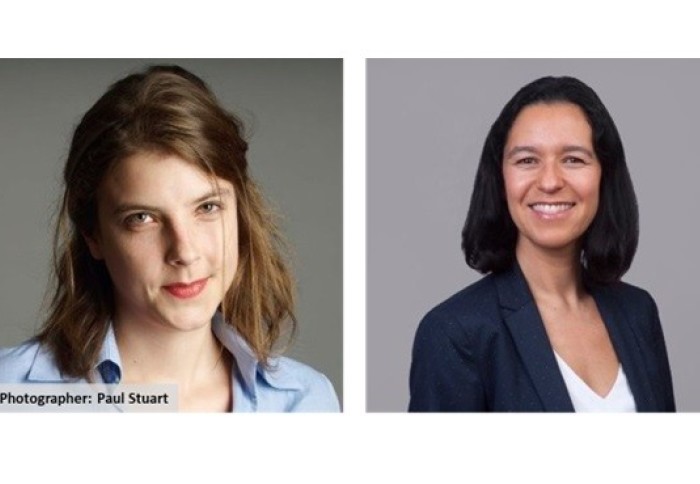Imperial graduates working to advance gender equality

Imperial graduates Niki Angelou (left) and Sarah Djari (right)
Leading up to International Women’s Day on the 8th of March, two Imperial graduates shared their experiences on working to advance gender equality.
International Women’s Day, held annually on the 8th of March, amplifies the call for diverse, equitable, and inclusive societies by spotlighting the vital role of women in society and ensuring the topic of gender equality remains on the global agenda.
Addressing gender inequalities through sustainable and inclusive development is especially pertinent in low- and middle-income countries where women are disproportionately impacted by existing structural inequalities. The United Nations (UN) has laid out a blueprint to address gender-based inequalities within Sustainable Development Goal (SDG) 5, which seeks to reinforce a global objective to “achieve gender equality and empower all women and girls.”
The Global Development Hub at Imperial is working to bring together the Imperial community to support and promote partnerships that advance the UN SDGs, including SDG 5.
Discussing how the Global Development Hub (GDH) is addressing SDG 5, Co-Chair of the GDH and Professor of HIV and Communicable Diseases, Professor Sarah Fidler said, “Given the longstanding gender disparity particularly amongst senior academics globally, the GDH is passionate about supporting and encouraging access to education and research irrespective of gender to achieve the SDG.”
Leading up to International Women’s Day, two Imperial graduates - Niki Angelou and Sarah Djari - shared their experiences with the Global Development Hub on how they are working to champion gender equality within their respective fields of energy and finance.
Working towards gender equality in the energy sector
Niki Angelou, a graduate of Imperial’s MSc Environmental Technology, works as a Senior Gender and Energy Consultant at the World Bank.
Originally joining the World Bank while conducting research for her Imperial master's thesis, Niki Angelou participated in fieldwork in the South Pacific aimed at improving energy access in remote islands. Her experience helped her realise that “energy access was not an end in itself.” Despite setting up infrastructure to better connect people to energy, “not all people benefit equally from access to energy,” she said. Women and people from marginalised communities are less likely to reap these benefits.
She explained that in low- and middle-income countries, “women are the primary users of energy in the household, but rarely the decision makers in energy-related spending.”
Niki Angelou explained that applying a gender lens to energy access and energy infrastructure development can have rippling positive effects which may improve “women’s health, through clean cooking and lighting solutions and electrification of health facilities that provide maternal care and safe childbirth. Moreover, electrification and clean cooking can also relieve girls from arduous household chores, freeing up time for their education.”
To advance gender equality, the World Bank Group (WBG) is progressing its Gender Strategy through a focus on four key impact areas, among which is the target to enhance “women’s voice and agency” with an embedded goal of ensuring "women’s representation, participation, and decision-making in local service delivery governance structures”, including that of energy.
Through these strategies, Niki Angelou said that more than 90% of “energy lending operations at the World Bank promote gender equality by committing to narrow one or more gender gaps.”
This includes creating inclusive employment opportunities in the energy sector, establishing gender-equal compensation measures for land-use change that results from energy infrastructure projects, and ensuring that women are equal and representative participants in community energy consultations and the decision-making processes that directly impact themselves and their communities.
Cultivating inclusion within global economies
Sarah Djari, holds a master's degree from Imperial in Nuclear Physics and Astrophysics. Now a Private Equity Principal at responsAbility Investments and Vice President of the Gender Lens Initiative for Switzerland, she pushes for gender equality and inclusion in the financial sector, more particularly in emerging markets, where the exclusion is most acute.
She discussed how women have been historically excluded from the financial sector, despite being contributing members of their local economies. This is especially true in emerging economies where women have often been excluded from the formal financial sector and financial decision-making. This has consistently been a barrier to grow their financial independence and empowerment in general.
Nearly one billion women do not have a formal bank or mobile bank account, hence access to basic financial services. This puts them in a role of “economic outsiders”, Sarah Djari said, even though if served and included, women have the ability to contribute 700 billion USD in GDP (Gross Domestic Product) growth in emerging markets. “The business case to serve those financially excluded women is immense and banks and insurance providers are leaving $700 billion behind per year by continuing to exclude them,” she said. Yet, women are a powerful, driven force of economic growth: if empowered and given an opportunity to participate in the labor market at par with men, the result would be an incremental $28 trillion to the global GDP by 2025.
Exclusion is a combined result of unequal access to education, healthcare, and technology to support financial autonomy, although in some cases comes from structural inequalities, such as the inability to hold or exchange land or property titles as a form of collateral needed to secure financial products.
Gender equality requires financial inclusion and the application of a gender lens to investment to close the gap on gender-based income inequality, improve education for women and girls, remove systemic barriers to access, and support women in actively participating in investment and financial decisions. Sarah Djari said, “It’s long been proven that if we don’t push intentionally for the gender equality agenda, it does not happen on its own.”
Article text (excluding photos or graphics) © Imperial College London.
Photos and graphics subject to third party copyright used with permission or © Imperial College London.
Reporter
Jaclyn Estrin
International Relations Office